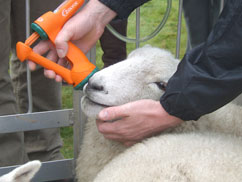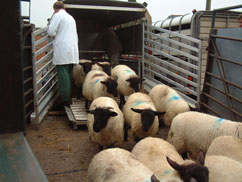Section Links
The importance of Quarantine for new stock
>> Click here to download a "Scops Quarantine" PDF
When replacements are introduced onto the farm there are two highly important aspects to consider.
 Firstly, preventing the introduction of diseases and parasites into the home flock which could be extremely costly - Ensure you protect your existing stock and livelihood.
Firstly, preventing the introduction of diseases and parasites into the home flock which could be extremely costly - Ensure you protect your existing stock and livelihood.
Secondly, whilst in isolation this provides an ideal opportunity to regularly assess their health and ensure these animals are protected to the same level as your existing stock.. In particular, to prevent losses from clostridial diseases, pneumonia and in the case of replacement breeding ewes infectious abortion.
Best practice indicates new stock MUST be yarded, treated and then isolated on pasture that has carried sheep and to avoid direct contact with other stock for a minimum of 3 weeks.
This procedure should apply even if all effort has been made to acquire clean healthy stock or stock is returning from another farm.
It is wise to follow a set procedure as recommended by SCOPS as summarised below :
 1) YARD NEW STOCK.- WHY SHOULD I YARD SHEEP?
1) YARD NEW STOCK.- WHY SHOULD I YARD SHEEP?
Any worm eggs already in the faeces when the sheep are treated will escape exposure to the anthelmintic. Yarding makes sure these are not dropped on to pasture. It also gives you time to have a good look for other problems e.g. CODD, CLA or Orf.
2) TREAT NEW STOCK - WHY SHOULD I USE MORE THAN ONE PRODUCT?
To guard against importing anthelmintic resistance, you need to make sure that all worms in the sheep are killed. Just using one product would leave the risk that worms resistant to that group were allowed to survive. It is worth the investment.
3) QUARANTINE - TURN THEM OUT ON TO PASTURE THAT HAS CARRIED SHEEP THIS SEASON AND KEEP THEM ISOLATED FOR AT LEAST THREE WEEKS.
WHY TURN GUARANTINED ANIMALS ON TO PASTURE THAT HAS CARRIED SHEEP?
You need to make sure that should any worms surviving treatment don't go on to reproduce and populate a clean pasture.Incoming sheep need to pick up the worm population present on your farm as soon as possible.
Remember it is your flock you are trying to protect, not the incoming sheep.

